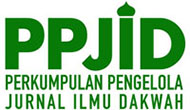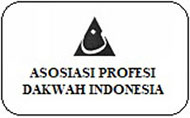Al-Ta’līf Approach to the Implementation of Da‘wah According to an Islamic Perspective
Abstract
A positive initial perception is able to influence the acceptance of the da‘wah target towards the da‘wah efforts carried out. Islam advocates a variety of al-ta’līf approaches aimed at bringing the target of da‘wah closer to the teachings of Islam. However, in some situations, efforts to deliver da‘wah today are seen to ignore the aspects of al-ta’līf advocated by Islam. Neglecting the al-ta’līf approach in the implementation of da‘wah has been found to threaten the harmony in the relationship between Muslims and non-Muslims, and even in certain situations, can scratch the image of Islam. This article aims to present the approaches of al-ta’līf in the implementation of da‘wah according to the Islamic perspective. Research data was obtained through documentation and content analysis methods. Findings found that the implementation of the al-ta’līf approach in da‘wah needs to be applied in actions, words and writing in line with the recommendations of Islam. This discovery is expected to be used as a guide in the implementation of da‘wah while upholding the image of Islam as the most perfect religion.
Keywords
Full Text:
PDFReferences
Ab Ghani, S. R., Omar, R., Mat Enh, A., & Kamaruddin, R. (2020). Challenges and Issue in the Development Da’wah of Islamic Movement in Malaysia Year, 1957-200. Jurnal Pengajian Islam, 13(1), 98–115. Retrieved from https://jpi.uis.edu.my/index.php/jpi/article/view/37
Abdul Ghani, M. Z., Rahim, N. N., Osman, K., & Mohamad Rasit, R. M. (2023). Parameter penulisan wasatiyyah pendakwah untuk menangani ekstremis Melayu muslim menerusi media sosial. Islamiyyat, 45(1), 161-172. https://doi.org/10.17576/islamiyyat-2023-4501-14.
Abd. Majid, M., Mohd Zin, A. A. & Sulaiman, M. A. (2015). Kategori Mualaf Dan Peruntukan Zakat Berdasarkan Surah al-Taubah, Ayat 60 : Suatu Manifestasi Metodologi Dakwah Al-Ta'lif Qabla Al-Ta'ri. Jurnal Darul Quran, Bil. 19.
Ahmed, S., & Ezzeddine, M. (2009). Challenges and opportunities facing American Muslim youth. Journal of Muslim Mental Health, 4(2), 159-174. https://doi.org/10.1080/15564900903245782
Aini, D. Z., & Don, D. A. G. (2022). The Implementation of Communication Skills in Da ‘Wah. Hamdard Islamicus, 45(1). https://doi.org/10.57144/hi.v45i1.276
al-Baghawī, A. M. H. (1989). Ma’ālim al-Tanzīl. Riyadh, KSA: Dār al-Ṭayyibah.
al-Bayanūnī, M. A. F. (2001). Al-Madkhal ilā ‘ilm al-da‘wah. Beirut: Mu’assasah al-Risālah.
al-Ghazālī, A. Ḥ. M. B. (2005). Letter to a Disciple: Ayyuhā al-Walad. Tobias Mayer (Trans). Cambridge: The Islamic Texts Society.
al-Ghazālī, M. (1997). Kayfa Nata āmal ma‘a al-Qur’ān. Cairo: Dār al-Wafā’.
al-Ḥākim. (2006). Al-Mustadrak ‘alā al-Ṣaḥīḥain. Beirut: Dār al-Maʿrifah.
al-Maḥallī, J., & al-Suyūṭī, J. (n.d.). Tafsīr al-Jalālayn. Mansurah, Egypt: Maktabah al-Īmān.
al-Mubārakfūrī, S. R. (2014). Sirah Rasulullah SAW. Kuala Lumpur: Penerbit Seribu Dinar.
al-Qaraḍāwī, Y. (1995). Thaqafat al-Dā‘iyah. Cairo: Maktabah Wahbah.
al-Qurṭubī, A. B. (2006). Tafsīr Al-Qurṭubī. Vol. 14. Beirut: Mu’assasah al-Risālah.
al-Sa‘dī, ‘A. R. N. (2002). Taysīr al-Karīm al-Raḥmān fi Tafsīr al-Kalām al-Mannān. Riyadh, KSA: Dār al-Salām.
al-Ṭabarī, A. J. J. (2001). Jāmi‘ al-Bayān ‘an Ta’wīl Āyi al-Qur’ān. Vol. 14. Cairo: Dār Hajar.
al-Zuḥāylī, W. (2003). Al-Tafsīr al-Munīr fī al-‘Aqīdah wa al-Sharī‘ah wa al-Manhaj. Vol. 13. Damascus: Dār al-Fikr.
Begum, A., Jingwei, L., Haider, M., Ajmal, M. M., Khan, S., & Han, H. (2021). Impact of environmental moral education on pro-environmental behaviour: Do psychological empowerment and islamic religiosity matter?. International Journal of Environmental Research and Public Health, 18(4), 1604. https://doi.org/10.3390/ijerph18041604.
Creswell, John W. (2013). Qualitative Inquiry & Research Design 3rd Edition. SAGE: United States of America.
Don, A. G., Puteh, A., Mokhtar, A. I., Abd Khafidz, H., Osman, K., Aini, Z., ... & Samah, S. A. (2023). Had ta'lif and social support in producing mualaf well-being. Al-Hikmah, 15(2), 119-135. Retrieved from https://spaj.ukm.my/jalhikmah/index.php/jalhikmah/article/view/509
Guleng, M. P., Kawangit, M. R. & Usman, A. H. (2019). A case study of islamic da’wah activities in Cordillera administrative region, Philippines among Muslim minority. Humanities & Social Sciences Reviews, 7(4), 559-571. https://doi.org/10.18510/hssr.2019.7476
HAMKA (n.d.). Tafsir al-Azhar. Vol. 2. Singapore: National Library Pte Ltd.
Hartman, R. J., Townsend, M. B., & Jackson, M. (2019). Educators’ perceptions of technology integration into the classroom: a descriptive case study. Journal of Research in Innovative Teaching & Learning, 12(3), 236-249. https://doi.org/10.1108/JRIT-03-2019-0044
Ibn Kathīr, I. (1995). Qaṣaṣ al-Anbiyā’. M. Al-Harbi (Trans.). Dār al-Ma‘ārifah.
Ibn Kathīr, I. (2000). Tafsīr al-Qur’ān al-/Aẓīm. Vols. 11 & 14. Giza: Mu’assasah Qurṭubah.
Ibn Manẓūr, M. (1994). Lisān al-‘Arab. Beirut: Dār Ṣādir.
Jaafar, R. (2020). Learning Strategy in Listening and Writing Skills among Chinese and Indian Ethnic Student when Learning of Malay Language. Jurnal Pendidikan Bahasa Melayu, 10(1), 64-76. Retrieved from https://spaj.ukm.my/jpbm/index.php/jpbm/article/view/220
Kuiper, M. J. (2021). Da'wa: A global history of Islamic missionary thought and practice. Edinburgh University Press.
Lebar, O. (2017). Penyelidikan kualitatif: Pengenalan kepada teori dan metode (Edisi Kedua). Tanjong Malim: Universiti Pendidikan Sultan Idris.
Manaf, A. M. A. (2018). Dakwah melalui media baru di Malaysia: Peluang atau cabaran? Al-Hikmah, 10(1), 119-128. Retrieved from https://spaj.ukm.my/jalhikmah/index.php/jalhikmah/article/view/306
Mohamad, N. (2019). Pendekatan pengajaran berasaskan manhaj al-Tadarruj kepada saudara baharu di Malaysia (Unpublished doctoral thesis), Kolej Universiti Islam Antarabangsa Selangor, Malaysia.
Mohamad, N., Majid, M. A., & Nasir, B. M. (2018). pendekatan dakwah dalam kaedah pengajaran kepada muallaf. Wardah, 19(01), 1-17. https://doi.org/10.19109/wardah.v19i01.2427
Mohd Zabidi, A. Z., & Abdul Hamid, F. A. F. (2014). Building up the influential filling in the new media through the da’wah writing. Al-Hikmah, 6(2), 78-90. Retrieved from https://spaj.ukm.my/jalhikmah/index.php/jalhikmah/article/view/98
Mohd. Zin, A. A. (2005). Metodologi dakwah. Kuala Lumpur: Penerbit Universiti Malaya.
Muzakki, A. (2007). Islam as a symbolic commodity: Transmitting and consuming Islam through public sermons in Indonesia. In Religious Commodifications in Asia (pp. 219-233). London: Routledge. https://doi.org/10.4324/9780203937877
Noor Azemy, M. N., & Mohamad Rasit, R. (2019). Street Approach to The Non-Income in Muslim NGOs in Pulau Pinang (Stepper Failure Level of Street Dakwah. Jurnal Pengajian Islam, 12(2), 120–131. Retrieved from https://jpi.uis.edu.my/index.php/jpi/article/view/16
Osman, M. N. A., & Shamsudin, R. (2024). Pendekatan Nabi SAW Dalam Mendidik Para Sahabat: Analisis Kaedah Membangkitkan Semangat Juang Perajurit Di Medan Perang. Jurnal Dunia Pengurusan, 6(2), 72-85.
Rahman, N. F. A., & Shah, N. S. M. (2020). Persepsi penganut muslim dan bukan Muslim terhadap isu-isu sensitif agama: Kajian di Lembah Klang. International journal of islamic thought, 18, 95-109. https://doi.org/10.24035/ijit.18.2020.185
Ramli, M. A. (2015). Dakwah dan cabaran postmodernisme. Kuala Lumpur: Penerbit Universiti Malaya.
Sayyid Qutb (1998), Fi Zilal al-Qur’an, j.3, Kaherah:Dar al-Mashruq, h.1669.
Shihab, M. Q. (2011). Tafsir al-Mishbāh: Pesan, kesan dan keserasian al-Qur’an. Vol. 3. Jakarta: Lentera Hati.
Usman, A. H., & Iskandar, A. (2022). Analysis of friday sermon duration: Intellectual reflection of classical and contemporary Islamic scholars. Journal of Religious & Theological Information, 21(1-2), 68-81. https://doi.org/10.1080/10477845.2021.1928349
Usman, A. H., Sailin, R., & Mutalib, M. F. M. A. (2019). The prophetic arts of communication: Some reflections on humanity. Humanities & Social Sciences Reviews, 7(4), 377-384. https://doi.org/10.18510/hssr.2019.7449
Yahya, M. A., & Hedzir, M. H. M. (2020). The Non-Muslim Approach to the Da’wah Movement in Malaysia: The Related Hadith Discussions. Akademika, 90(3), 163-171. Retrieved from https://ejournal.ukm.my/akademika/article/view/40446
Zaidi, N. I. C., & Muhamat, R. (2020). Personaliti pendakwah dalam menyantuni masyarakat non muslim. Al-Hikmah, 12(1), 19-36. Retrieved from https://spaj.ukm.my/jalhikmah/index.php/jalhikmah/article/view/379
Zaydān, A. K. (2002). Uṣūl al-Da‘wah. Beirut: Mu’assasah al-Risālah.
DOI: http://dx.doi.org/10.24014/jdr.v35i2.32460
Refbacks
- There are currently no refbacks.

This work is licensed under a Creative Commons Attribution-ShareAlike 4.0 International License.
Editorial Office:
2nd Floor, Building of Faculty of Da'wah and Communication, Universitas Islam Negeri Sultan Syarif Kasim Riau. Jl. HR Soebrantas Km 15, Simpangbaru, Tampan, Pekanbaru
Email : jurnalrisalah@uin-suska.ac.id

This work is licensed under a Creative Commons Attribution-ShareAlike 4.0 International License.














